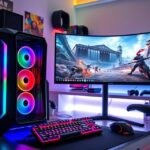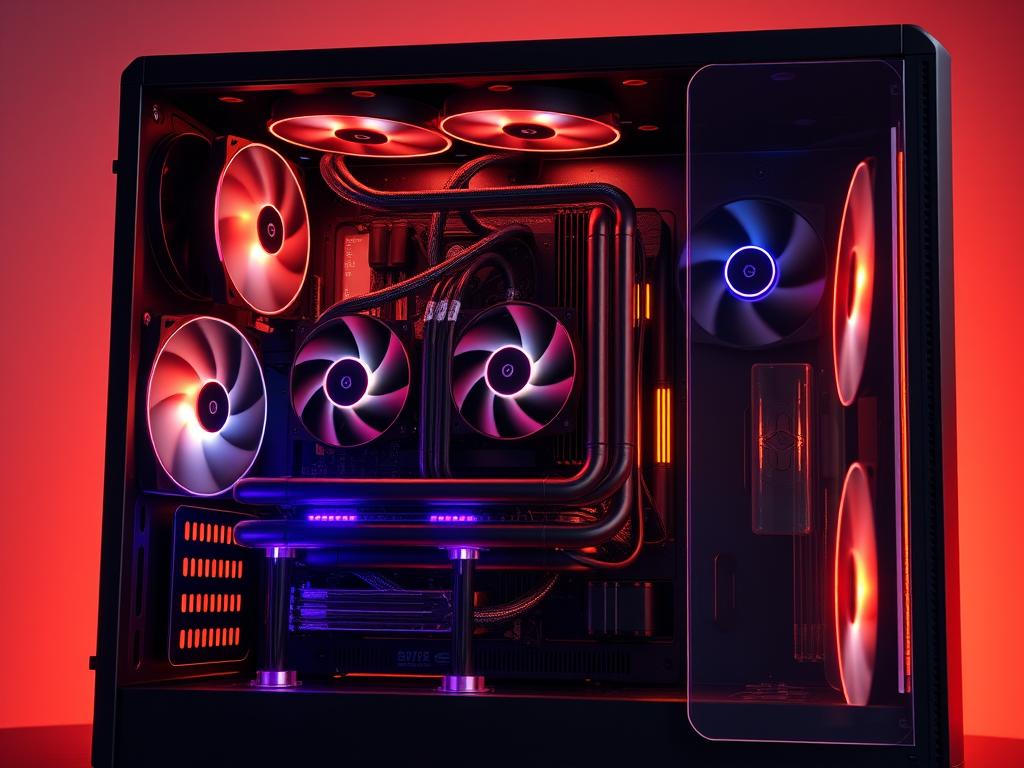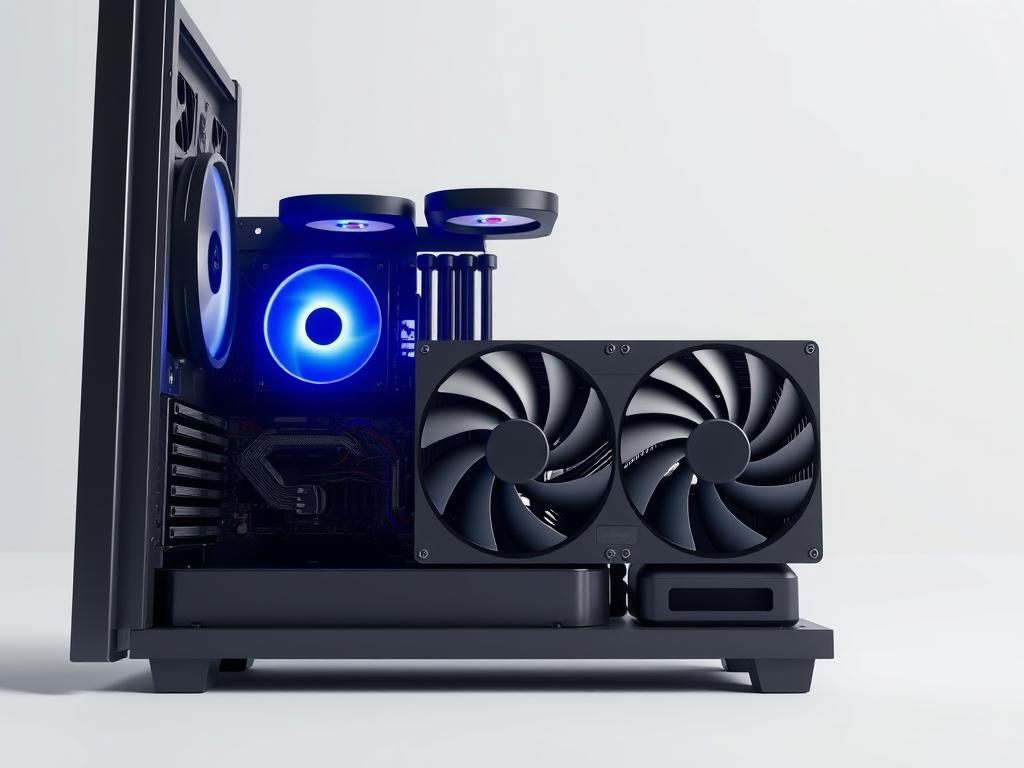Cooling is vital for top-notch gaming PC performance.
Gamers often struggle to figure out how many fans their high-powered machines need.
PC fan needs change based on system setup and use.

Simple tasks might only need two fans.
However, gaming PCs require better cooling to avoid overheating issues.
A good fan setup isnt just about numbers.

Its about smart placement and airflow control.
Modern gaming rigs create lots of heat from powerful parts.
Processors can handle up to 95 degrees Celsius.

But effective cooling is crucial.
Gaming systems need a strong approach to manage heat.
Knowinggaming PC coolingneeds helps create a balanced system.

This supports peak performance and protects valuable hardware.
Case fans are vital for keeping computer parts cool.
These small devices create airflow to prevent overheating and hardware damage.

Related Posts:
Modern gaming rigs produce a lot of heat.
Case fans are crucial for getting rid of this heat.
Goodcoolingneeds smartfan placementand airflow knowledge.

Intake and Exhaust Airflow Types
Airflow typesare key to cooling.
This means intake and exhaust fans work together well.
Thermal Management Fundamentals
Good cooling isnt just about adding fans.
Is 3 Fans Enough for a Gaming PC?
The number of fans needed for a gaming PC isnt set in stone.
Athree-fan setupis often seen as a good starting point.
However, its effectiveness depends on several key factors.
A common cooling setup includes:
Thethree-fan setupoffers solidthermal management.Most gaming PCs can keep cool with this layout.
Yet, actual cooling depends on various elements.
Front-to-back airflow remains the most effective cooling method.
Three fans can work well for many setups.
However, power users might need extra cooling for intense gaming or overclocked systems.
Professional builders recommend maintaining positive air pressure for optimalcooling efficiency.
Your specific gaming PC will determine the best fan setup.
Case size, component heat, andgaming intensityall play a role.
These factors help decide the right cooling strategy for your rig.
Essential Factors Affecting Fan Requirements
Cooling a gaming PC requires a tailored approach.
Several key factors determine the ideal number of fans for your system.
Understanding these elements helps gamers create an efficient cooling strategy for their hardware.
Compact cases might limit airflow options.
Smaller form factors like mini-ITX need precise cooling solutions.
These cases require careful planning to manage heat effectively.
Component Heat Generation
High-performance gaming parts produce a lot of heat.
Modern CPUs and GPUs can reach over 80C during intense gaming.
Thisheat outputdirectly affects the number of fans needed.
Gaming Intensity and Thermal Management
Long gaming sessions with demanding titles increase heat stress.
Competitive games or 4K multiplayer shooters push hardware to its limits.
These situations call for more aggressive cooling methods.
Continuous high-performance computing needs thoroughthermal management.
This approach helps prevent performance throttling during intense gaming.
Effective cooling maintains consistent performance during intense gaming experiences.
Its not just about preventing overheating.
Optimal Fan Placement and Configuration
Strategicfan placementis crucial for a gaming PCs cooling.
It impacts your systems thermal performance and longevity.
The right approach can make a significant difference.
Experts recommend a balanced setup of intake and exhaust fans.
A minimal configuration often includes:
Proper fan placement creates a smooth airflow path.
This efficiently removes heat from critical components.Positive air pressurehelps minimise dust and maintain optimal cooling.
Neat cable management is vital for unobstructed airflow.
Organised cables prevent air disruption and support efficient cooling.
This helps maintain optimal airflow throughout your system.
Pro tip: Always prioritise front intake fans with mesh panels for maximum airflow potential.
Your gaming PCs components and usage intensity matter.High-performance setupsmay need more aggressive fan placement.
This helps manage heat effectively in demanding situations.
When Three Fans Might Not Be Enough
Gaming enthusiasts often find three fans insufficient forhigh-performance setups.
Overclocking becomes crucial when advanced components generate excessive heat.High-performance setupsrequire more robust cooling solutions.
Certain scenarios demand enhanced cooling:
Standard three-fan setups may struggle withthermal management.
Enthusiasts might need 5-7 fans for optimal cooling.
Full tower cases can require 4-11 fans, depending on performance needs.
Advanced cooling strategies include:
Matching fan technologies to specific computing needs is crucial.
This ensures stablesystem performanceduring demanding tasks.
It also prevents potential thermal throttling issues.
Three fans might suffice for some setups.
However,PC build optimisationneeds a tailored approach for individual gaming needs.
Cooling requirements vary based on component selection and usage intensity.
Overclocking and high-performance parts can push three-fan setups beyond their limits.
A well-planned cooling solution can lower internal temperatures by 5-10 degrees Celsius.
Regular maintenance is vital forcooling efficiency.
Dust build-up, software performance, and component choice affect thermal management.
Monitoring temperatures and cleaning internal parts help maintain peak performance.
Understanding your specific cooling needs is crucial for system stability.
Its important for both casual gaming and demanding professional applications.
A thoughtful approach to PC cooling can greatly enhance your computing experience.
FAQ
How do case fans help cool a gaming PC?
Case fans are vital for maintaining optimal temperatures in gaming PCs.
They create airflow that removes heat from internal components.
Intake fans draw cool air in, whilst exhaust fans expel warm air out.
Are three fans always sufficient for a gaming PC?
Three fans can be enough for mid-range gaming setups.
However, high-performance systems may need more cooling.
This depends on case size, component specs, andgaming intensity.
Whats the difference between intake and exhaust fans?
Intake fans draw cool air into the PC case from outside.
Exhaust fans push warm air out.
A balanced airflow ensures fresh air replaces hot air from components.
How does case size impact cooling requirements?
Smaller cases have more restricted airflow, limiting cooling efficiency.
Larger cases offer more space for fans and better air circulation.
The case size affects fan placement and heat management.
What factors increase a gaming PCs cooling needs?
High-performance components like powerful GPUs and overclocked CPUs increase cooling needs.
Extended gaming sessions and resource-intensive games also generate more heat.
Compact case designs can further challenge cooling efforts.
How can I improve my gaming PCs cooling?
Optimise fan placement and ensure proper intake and exhaust configurations.
Manage cables to maintain unobstructed airflow.
Consider upgrading CPU coolers or adding liquid cooling forhigh-performance setups.
When might I need more than three fans?
You may need extra fans when running multiple GPUs or heavily overclocked components.
Consistent high temperatures during intensive gaming also warrant more cooling.
Watch for thermal throttling or unexpected system shutdowns.
What is positive air pressure in PC cooling?
Positive air pressure shows up when intake fans move more air in than exhaust fans push out.
This setup helps reduce dust build-up inside the case.
It can improve overall system cleanliness and cooling efficiency.
How do I know if my gaming PC is running too hot?
Use software like MSI Afterburner or HWMonitor to check component temperatures.
CPU temps above 80C or GPU temps above 85C during gaming indicate cooling issues.
These may require additional fans or alternative cooling solutions.
Can cable management affect PC cooling?
Yes, effective cable management is crucial for optimal airflow.
Messy cables can obstruct air circulation, creating hot spots.
Neatly routing and securing cables ensures unimpeded air movement within the PC case.